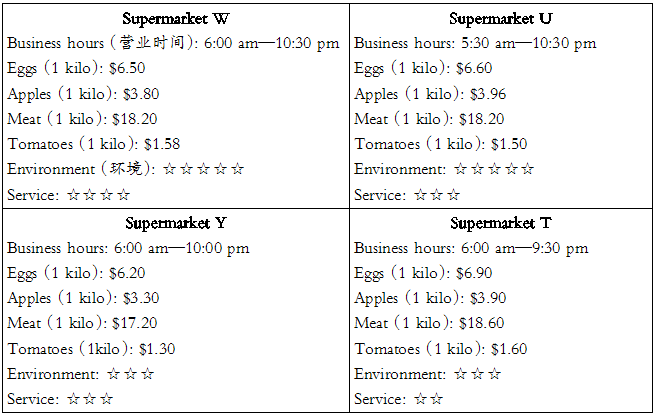阅读理解。
Never go into a supermarket hungry! This is a good piece of advice. If you go shopping for food before
lunchtime, you'll probably buy more than you plan to. Unfortunately, however, just this advice isn't enough
for consumers these days. Modern shoppers need an education in how and how not to but things at the
store. First, you check the weekly newspaper ads. Find out the items that are on sale and decide if you really
need these things. In other words, don't but anything just because it's cheaper than usual! "New and
Improved!" or "All Natural" on the front of a package influence you. Instead, read the list of ingredients
(成分) on the back. Third, compare prices: that is, you should examine the prices of both different brands
and different sizes of the same brand.
Another suggestion for customers is to buy ordinary items instead of famous brands. Ordinary items in
supermarkets come in plain packages. These products are cheaper because producers don't spend much
money on packing or advertising. The quality, however, is usually as good as the quality of well-known
name brands. In the same way, in buying clothes, you often find high quality and low pices in brands that
are not famous. Shopping on discount clothing stores can help you save a lot of money. Although these
stores aren't very attractive, and they usually do not have individual dressing rooms, not only are the prices
low, but you can often find the same famous brands that you find in high-priced department stores.
Wise consumers read magazine ads and watch TV commercials, but they do this with one advantage:
knowledge of the psychology behind the ads. In other words, well-informed consumers watch for information
and heck for misinformation. They ask themselves questions: Is the advertiser hiding something in small print
at the bottom of the page? Is there any real information in the commercial, or is the advertiser simply showing
an attractive image? With the answers to these questions, consumers can make a wise choice.
1. Before you decide to buy things you should ____.
A. make sure whether they are on sale
B. consider if you really need them
C. examine the prices of different brands
D. read the words on the front of the package
2. The writer suggests consumers buy ordinary products because ____.
A. they come in plain package
B. they are advertised on newspapers
C. they are both good and cheaper
D. the quality is better than that of famous ones
3. The main idea of the last paragraph is that ____.
A. ads and commercials sometimes tell lies
B. advertisements sometime hide some information
C. good consumers never read ads and commercials
D. we should make good use of ads and commercials


